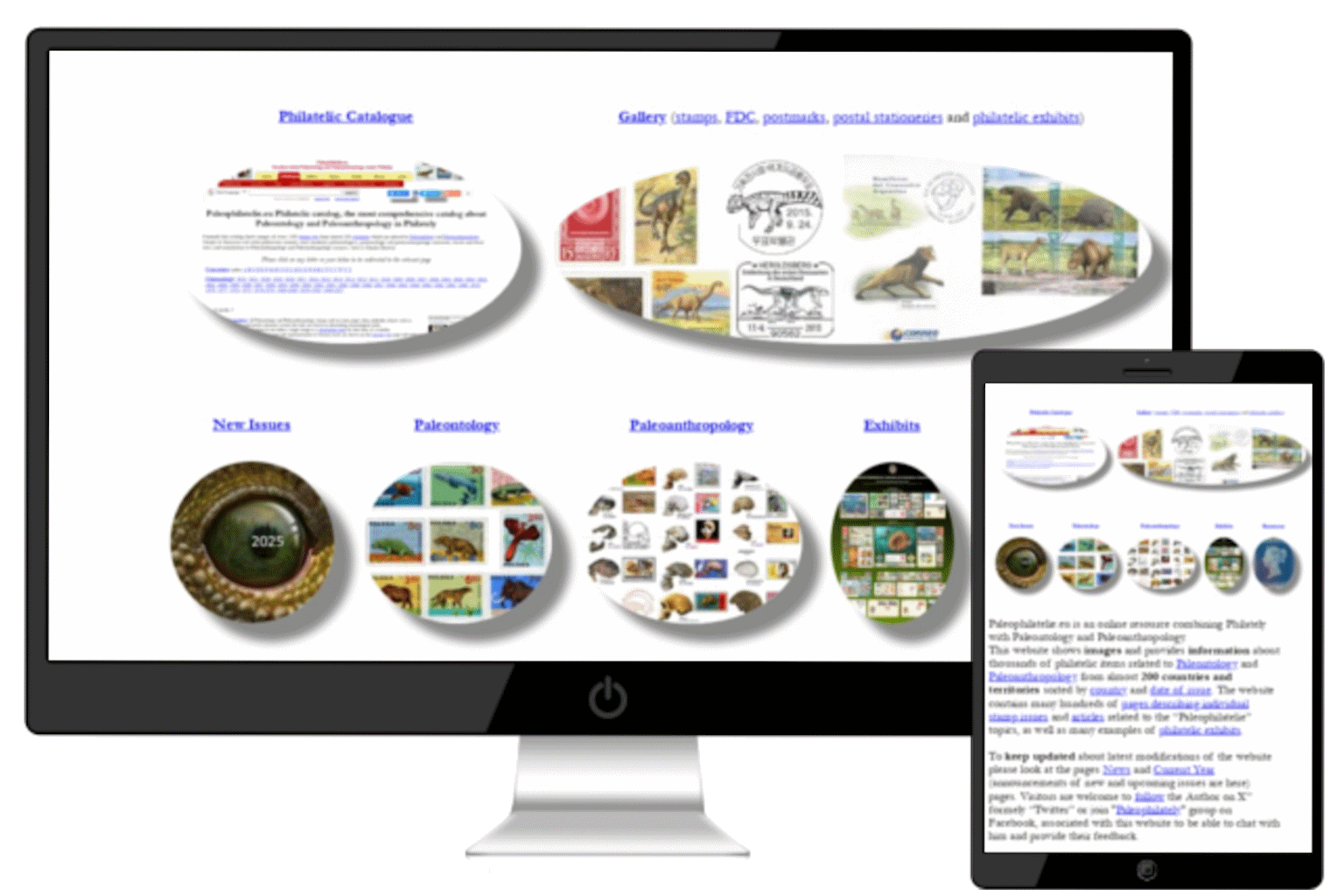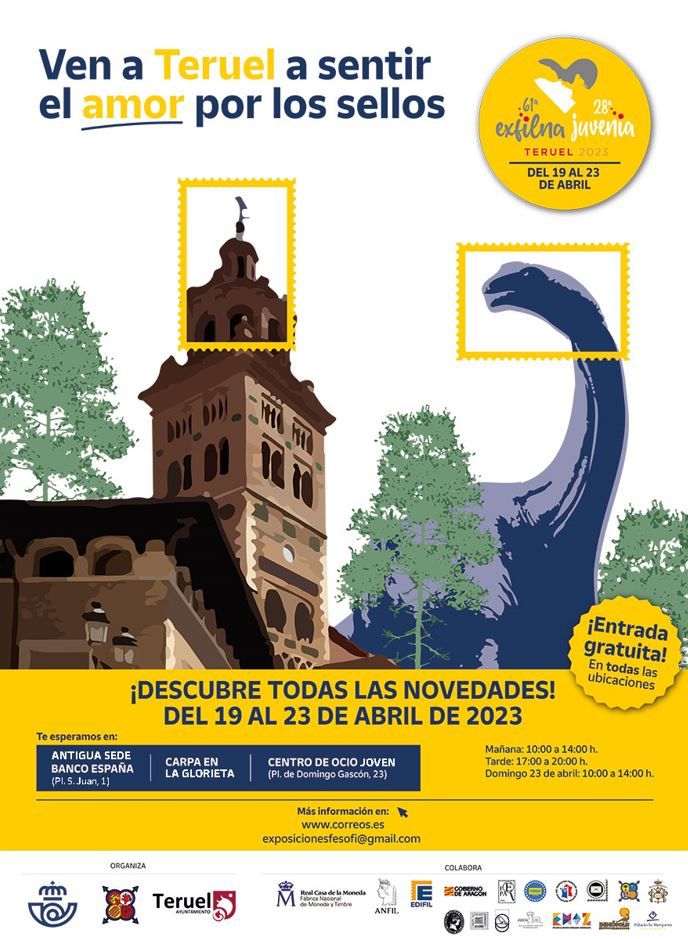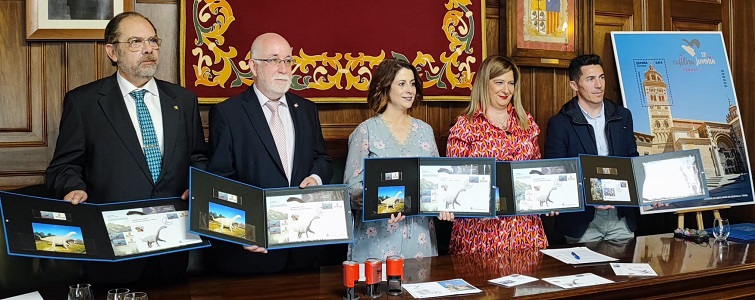Spain 2023
"JUVENIA, Teruel, Dinosaurs - Aragosaurus ischiaticus"
| Issue Date |
19.04.2023 |
| ID |
Michel:
Scott:
Stanley Gibbons:
Yvert:
Category: pR
|
| Designer |
|
| Stamps in set |
1 |
| Value |
€2 - Aragosaurus Ischiaticus
|
| Emission/Type |
commemorative |
| Issue place |
Teruel |
| Size (width x height) |
stamp and the tab: 40.90mm x 28.80mm,
Premium Sheet of 16: 260mm x 200mm.
|
| Layout |
Regular Sheet of 50: 25 stamps + 25 tabs,
Premium Sheet of 16: 8 stamps + 8 tabs.
|
| Products |
FDC x1,
Postcard x1
|
| Paper |
Coated, gummed, phosphorescent |
| Perforation |
13.75 x 13.25 |
| Print Technique |
Offset lithography |
| Printed by |
Fábrica Nacional de Moneda y Timbre-Real Casa de la Moneda (RCM-FNMT)
|
| Quantity |
Stamps: 125.000 (total),
Sheets of 16: 5.000,
Postcards: 5.000
|
| Issuing Authority |
Correos y Telégrafos S.A. |
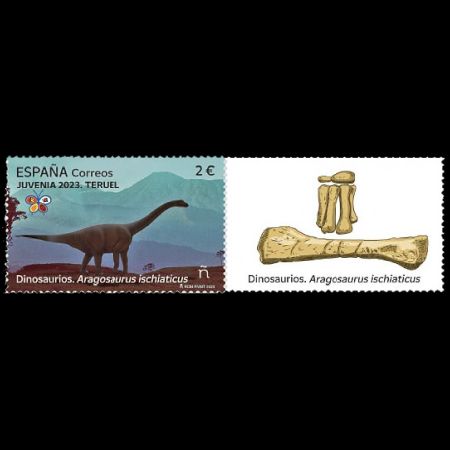
On April 19
th, 2023, Post Authority of Spain, on occasion of
the 28
th National Exhibition of Youth Philately in Teruel, issued the
stamp with attached tab - "JUVENIA, Teruel, Dinosaurs -
Aragosaurus ischiaticus".
The stamp was issued in two different Sheets:
- Regular Sheet of 50: 25 stamps with 25 attached tabs, with regular, white selvages
- "Premium" Sheet of 16: 8 stamps with 8 attached tabs,
with big colorful selvages, depicting Aragosaurus ischiaticus in a landscape.
The stamp has a face value of 2 euros, which doesn't match any of Spain's standard
postal rates at this time:
- Rate A - 0,78€. For "standardized" Ordinary National Letter or Postcard, up to 20 g.
- Rate A2 - 0,88€. For Letter or Ordinary National Postcard "standardized", from 20 to 50 g.
- Rate B - 1,65€. For "standardized" Ordinary International Letter or Postcard addressed to Europe (including Greenland), up to 20 g.
- Rate C - 1,75€. For "standardized" Ordinary International Letter or Postcard addressed to the rest of the world (except USA, Canada, Japan, Australia and New Zealand), up to 20 g.
- Rate D - 2,10€. For Letter or Ordinary International Postcard "standardized" addressed to USA, Canada, Japan, Australia and New Zealand, 20 g.
Between April 19
th and 23
rd, 2023, Teruel hosted:
the 61
st National Philatelic Exhibition and Spanish Championship - EXFILNA 2023
and
the 28
th National Exhibition of Youth Philately and Spanish Championship - JUVENIA 2023,
as well as the 5
th European Championship of Maximofilia.
One of the exhibits, made by García Díez, José Antonio -
"De los primeros pobladores al ser humano"
(From the first dwellers to the human), was about animal evolution.
These events were organised by the Spanish Federation (FESOFI) and the Spanish Post (Correos).
The exhibition was held under the patronage of the City of Teruel and the cooperation of the Royal Mint,
the Aragonese Federation of Philatelic Associations, the Association of Dealers in Philately,
Numismatics and Collectables, ANFIL, and EDIFIL publishers.
Three places in Teruel hosted the shows:
- The Bank of Spain hosted the best collections of Master Class and Class of Champions,
Traditional Class, Postal History Class and Philatelic Literature Class.
In total 37 exhibits on 242 frames, plus Philatelic Literature corner.
- Youth Leisure Center hosted
Exfilna-Juvenia and V European Championship of Maximofilia in the Youth category
In total 117 exhibits on 415 frames.
These Championships included participators from
Spain,
Brazil,
France,
Italy,
Luxembourg and
Romania.
- The Tent of the Plaza La Glorieta hosted
the Trade Fair with booths of CORREOS, and FNMT, those of FESOFI, Teruel City Council, ANFL and EDIFIL.
The event was attended by the director of Post Office Philately, Leire Díez Castro,
the mayor of Teruel, Emma Buj, the president of the Spanish Federation of Philatelic
Societies, José Antonio Arruego and the President of the Aragonese Federation of
Philatelic Societies, José Ángel Campo Huerta.
The mayor of Teruel welcomed the attendees and after her speech, the Aragonese and
Spanish presidents of the Federation of Philatelic Societies presented the program of
Exfilna and Juvenia.
Subsequently, the Director of Philately announced the three stamps that
Correos issued for this celebration.
The stamps presentation ceremony.
Image credit ECO de Teruel
After the commemorative postmark, the attendees, after leaving the consistory, have
gone to one of the venues of the Exhibition, the Plaza de la Glorieta, to officially
inaugurate EXFILNA-JUVENIA 2023.
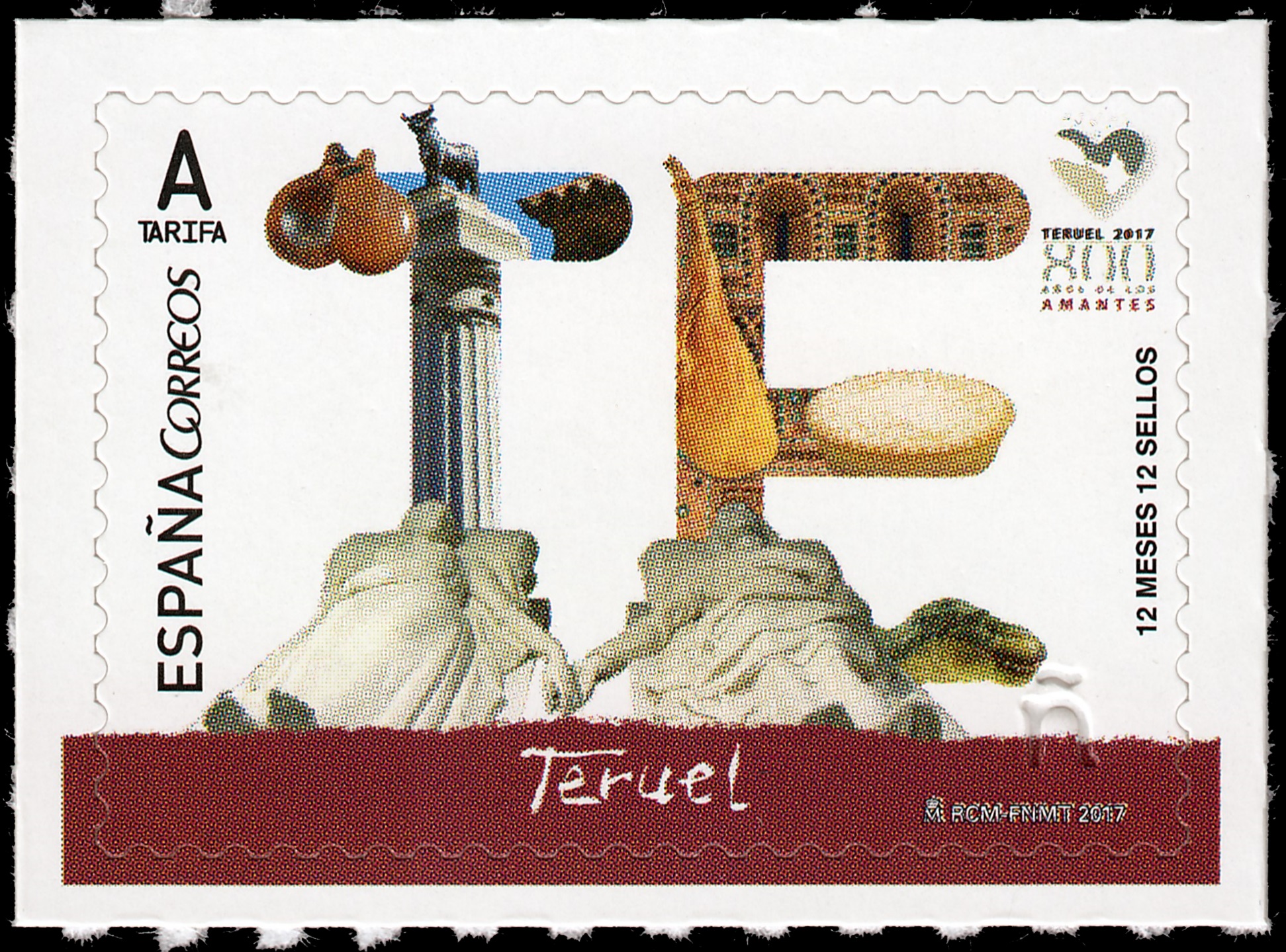 |
|
A head of Aragosaurus is depicted on the bottom-right side of the self-adhesive stamp -
"Teruel region".
MiNr.: 5199, Scott: 4169.
|
The JUVENIA is biennial exhibition, every time it takes place in a different city and for the first
time in its history it coincides with the celebration of the EXFILNA.
Both exhibitions have 3 locations, but the one
dedicated to youth concentrated its activities in the Youth Leisure Center.
Being an exhibition aimed at a younger audience, the aim of Spanish Post was to
continue the dinosaur-themed series that in
2015
consisted of the
Ankylosaurus,
Tyrannosaurus,
Triceratops and
Diplodocus stamps;
and in
2016 the
Europelta,
Pelecanimimus,
Proa
and
Turiasaurus.
This year, the dinosaur chose was
Aragosaurus ischiaticus.
The stamp shows a reproduction of what the dinosaur looked like in life.
On the tab is an illustration of several of the fossils of this animal.
Aragosaurus was a quadrupedal, herbivorous sauropod dinosaur
with a large neck and tail and a small head.
The forelimbs of the dinosaur were shorter than the hindlimbs, although not as short as is common in
camarasaurids.
Aragosaurus teeth were spatulate in shape and ornamented by longitudinal
grooves.
Spatulate means that the teeth broaden towards their upper edge into a spoon-like
or spatula-like shape.
Its name means "Reptile of Aragon".
Aragosaurus lived during the Upper Jurassic and the Lower Cretaceous
(150-140 million years ago) periods and was about 17 meters long and about 25 tonnes
in weight, who lived in the environments near the coastline of the Tethys Sea.
Aragosaurus ischiaticus is the first dinosaur discovered in
Spain.
It was described by Sanz, Buscalioni, Casanovas and Santafé in 1987, based on
associated postcranial remains of one individual from the Las Zabacheras site 150m
north of the village of Galve in Teruel Province, Aragon, north-eastern Spain -
the Villar del Arzobispo Formation.
The Villar del Arzobispo Formation in Spain reveals a high diversity of sauropods living on the
Iberian Plate during the Jurassic–Cretaceous transition.
To date, diplodocids, turiasaurs, and titanosauriforms have been recovered from Spanish rocks.
Aragosaurus is one of four genera of sauropod recovered from the Villar del Arzobispo Formation
in Spain, making the latter an important contributor to understanding of Late Jurassic sauropod diversity
alongside the well-known contemporaneous faunas of the African Tendaguru Formation in
Tanzania
and the North American Morrison Formation (USA).
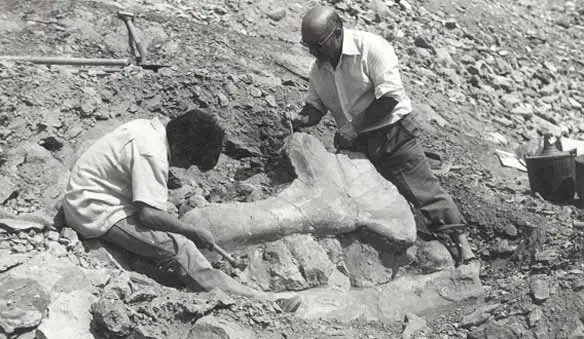 |
The extraction of the right scapula at the site of Las Zabacheras by José María Herrero.
Image credit: conninosyequipaje.com
|
|
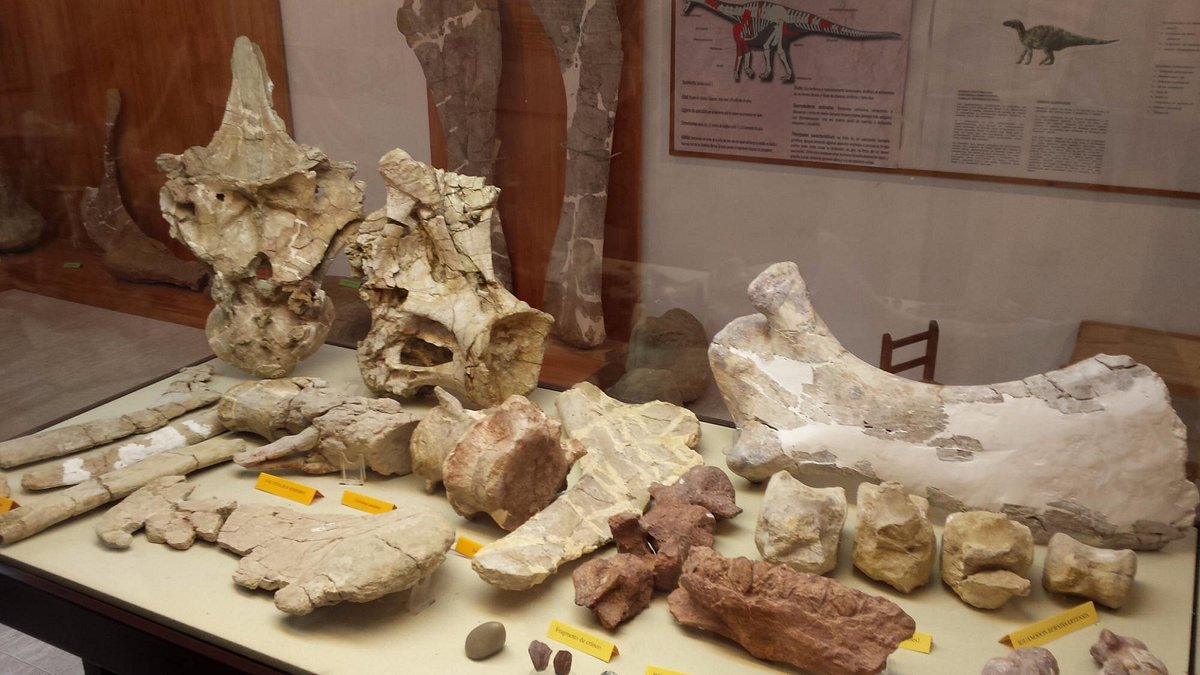 |
The fossils on display at "Museo Paleontologico de Galve"
Image credit: tripadvisor
|
|
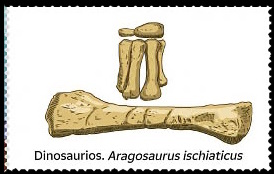 |
The bones of Aragosaurus ischiaticus on the tab attached to the stamp.
|
The fossils material found is inadequate for a formal description, so this taxon needs further
documentation and analysis.
Aragosaurus was originally referred to the
Camarasauridae and has been provisionally regarded
as
Eusauropoda incertae sedis by Upchurch at al. in 2004.
The recent research supported by cladistic analysis suggest that
Aragosaurus ischiaticus
is a basal macronarian that is more closely related to Titanosauriformes than is
Camarasaurus.
Macronaria is a clade of sauropod dinosaurs, named after the large diameter of
the nasal opening of their skull, known as the external naris (the nostrils),
which exceeded the size of the orbit, the skull opening where the eye is located.
In 1934, construction of the old road to Galve led to the discovery of the type locality,
initially named ‘La Carretera’.
The first recorded discovery of dinosaur bones was in 1958, when a resident of the village, José María
Herrero, reported dinosaur bones from Galve in the local newspaper "Lucha", and then informed the service
of excavations of the Diputación Provincial de Teruel.
Dimas Fernández-Galiano and Purificación Atrián, members of IET, visited Galve and
located elements of
Aragosaurus held in private hands by members of the local population.
After this, Fernández-Galiano returned to Galve in order to excavate new remains from the Las Zabacheras
site, including some of the vertebrae and long bones.
All of these elements, including those collected from villagers and the vertebrae and long bones collected
later, were housed in the Museo Provincial de Teruel.
Albert F. de Lapparent (1905–1975), from the Institut Catholique, Paris, was the first palaeontologist
to suggest that these remains represented a new taxon of sauropod in the scientific journal "Teruel".
Subsequently, in 1982, a team of palaeontologists comprising researchers from the Universidad
Autónoma de Madrid and the Instituto de Paleontología de Sabadell
(today the Institut Català de Paleontología) informed José María Herrero of the intention to excavate
the Las Zabacheras site during the following year; however, it transpired that José María Herrero
had already excavated part of the site, so an agreement was made to carry out joint fieldwork.
The resulting material, known as the "J.M. Herrero Collection", enabled the first dinosaur from Spain to
be named:
Aragosaurus ischiaticus.
The holotype also included the material cited as ‘the sauropod from Las Zabacheras’ by Lapparent
(1960), and a tooth was referred from a nearby unnamed locality.
As a result of these events, the holotype specimens are distributed between two collections:
(1) the material recovered by Dimas Fernández-Galiano in the 1950s, which is deposited
at the Museo Provincial de Teruel with the acronym ‘IG’;
and (2) the material excavated by J.M. Herrero and the team of author J.L.S. in the 1980s,
with acronym ‘ZH’, now in the Museo Paleontológico de Galve.
Products
| FDC |
Postal stationery |
Premium Sheet |
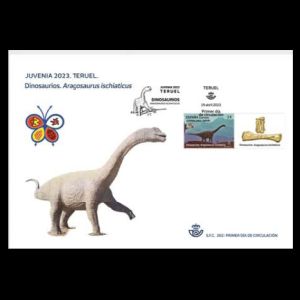 |
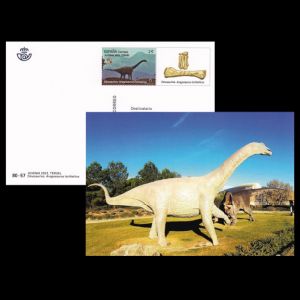 |
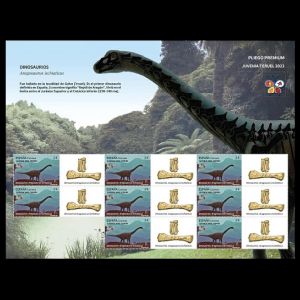 |
|
Lifesize model of Aragosaurus ischiaticus from the riverbank near the village of Galve,
depicted on the cachet of the FDC and on front size of the prepaid postcard.
|
|
|
| First-Day-of-Issue Postmarks |
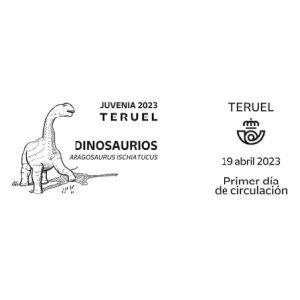 |
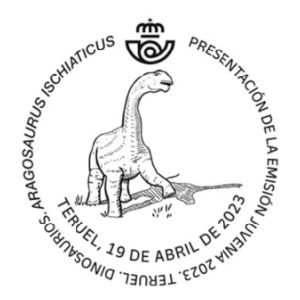 |
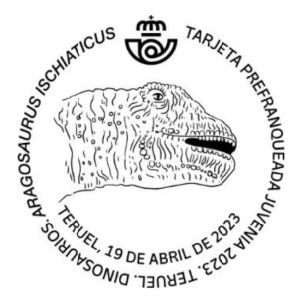 |
|
This postmark was available in EXFILNA Teruel (as well as in Madrid and
Barcelona), at the Post Office booth, between April 19 and 23, 2023.
|
This postmark was supposed to be used to cancel the postal stationery.
It was available in Teruel on April 19th 2023.
|
Additional Postmark used to cancel postal stationeries (prepaid postcards)
from the limited edition set - very rare.
|
|
| Some stamps from the Regular Sheet |
Example of circulated cover |
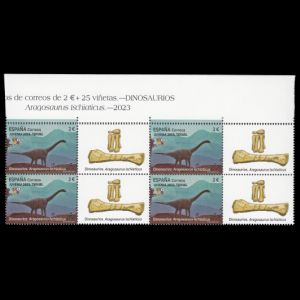 |
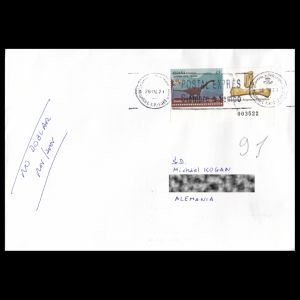 |
|
|
|
|
References

|
- Technical details and official press release:
Post of Spain -
the stamp,
EXFILA,
FDC,
First-Day-of-Issue Postmark for the FDC,
Postal Stationery,
First-Day-of-Issue Postmark for the Postal Stationery.
-
exposicionesfesofi.es (these articles does not exist anymore)
folklore-fosiles-ibericos blogspot,
Spanish Post,
official website of Teruel city (the article does not exist anymore),
ecodeteruel.tv.
- Aragosaurus:
Wikipedia,
aragosaurus.com,
dinosaurierwelt,
dinosaurencyclopedia,
"THE DINOSAURIA - 2nd edition", edited by DAVID B. WEISHAMPEL, PETER DODSON, HALSZKA OSMÓLSKA
Published in 2004 by the Regents of the University of California, ISBN 0-520-24209-2.
"Bernissart Dinosaurs and early Cretaceous terrestrial ecosystems", edited by Pascal Godefroit.
Published in 2012 by Indiana University Press, ISBN 978-0-253-35721-2.
"The anatomy, phylogenetic relationships, and stratigraphic position of the Tithonian–Berriasian
Spanish sauropod dinosaur Aragosaurus ischiaticus", by
RAFAEL ROYO-TORRES, PAUL UPCHURCH, PHILIP D. MANNION, RAMÓN MAS, ALBERTO COBOS, FRANCISCO GASCÓ,
LUIS ALCALÁ1 and JOSÉ LUIS SANZ, the Zoological Journal of the Linnean Society, v. 171, i. 3, p. 623-655.
Acknowledgements
Many thanks to Dr.
Peter Voice, PhD Department of Geological and Environmental Sciences, Western Michigan University, USA,
for his help in finding information and for review of a draft of this article.
